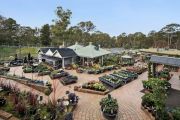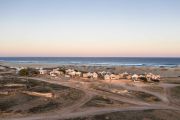
New Forests buys half of McPhee’s Wagyu operation
Fund manager New Forests has taken a half stake in the $150 million-plus McPhee Beef Farms operation, built up by the McPhee family over three decades into one of the country’s top suppliers of Wagyu beef.
To back the new fund that will hold the investment, New Forests has brought together a series of high-powered institutional investors, including Australia’s Clean Energy Finance Corporation, Japan’s Kyushu Electric Power, Germany’s BVK and Sweden’s AP2.

The McPhee family is well-known across the country’s agriculture and logistics sectors through its separate farming and McPhee Freight businesses. Four years ago, it sold off a large swag of its logistics real estate to Dexus for close to $190 million.
This time around, the family is partially selling down its cattle property portfolio and beef operation in NSW’s New England region. Trading under the Maria River Cattle Company, the nearly 8400-hectare estate near Yarrowitch and Walcha is spread over several properties, including the Benditi aggregation and Glen Eagle.
It is home to an Angus herd that has been crossed with full-blood Wagyu bulls and is a major supplier of F1 Wagyu – an industry term referring to first-generation crossbred cattle. The farms can run 15,000 steers annually.
Under the deal with New Forests, the operation will be known as Benditi Pastoral Company, and existing staff and the management will be retained in a new company set up by McPhee. New Forests declined to say whether it would consider proceeding to a 100 per cent buyout at a later date.
For New Forests’ David Shelton, who leads its Australian and New Zealand arm, the latest investment aligns neatly with what the fund manager calls its “whole of landscape” approach.
“High-quality land is versatile,” he told The Australian Financial Review.
Under that rubric, New Forests takes a broad view of its agricultural and forestry assets, which are to be considered as “landscape”, that can be put to various uses rather than forever tied to just one commodity.
That includes an openness to bring on additional revenue streams, related to carbon, biodiversity and renewable energy sources such as solar and wind.
The strategy underpins the Australia New Zealand Landscapes and Forestry Fund (ANZLAFF), which will hold the McPhee investment along with three other properties acquired in the Central Tablelands of NSW.
“When you’re operating commodity-based businesses at scale, you need to have the ability to work across different types of land use, and so our ANZLAFF fund has the flexibility to do that,” Shelton said.
The McPhee transaction, still subject to approval from the Foreign Investment Review Board, was brokered by Rawdon Briggs of Colliers Agribusiness and Sam Meares of Meares Associates. Ellerston Capital’s Martin Hanrahan was the corporate adviser to New Forests.

In January, New Forests announced the final close of ANZLAFF, its fourth fund focused on Australia and New Zealand, after raising about $600 million. Previous vehicles in the series have raised $500 million, $700 million and $900 million, respectively.
In all, New Forests has close to $12 billion under management globally, with the bulk of that in Australia and New Zealand.
The platform’s early growth was turbocharged by buying Great Southern Group – a managed investment scheme for plantations – out of administration, and the collapsed Tasmanian wood chip miller, Gunns.
Another big step forward came three years ago when Japanese investors Mitsui & Co and Nomura Holdings bought 90 per cent of the fund manager.
As part of New Forests, the fund manager set up the New Agriculture business in 2022 to manage several big acquisitions – including Lawson Grains’ 90,000-hectare cropping portfolio from Macquarie and billionaire Hui Wing Mau’s 3 million hectares in the East Kimberley – and then look to build a global portfolio of agricultural assets.
Those initial acquisitions were backed by separate accounts from Canada’s Alberta Investment Management Corporation, or AIMCo.
This year, New Agriculture launched its first major capital raising with a $750 million target. Its purpose is to establish a larger fund aimed at domestic and offshore institutions, high net worth individuals and large family office types.
This latest fund has been dubbed the New Agriculture Landscape Opportunity Fund, or NALOF.











